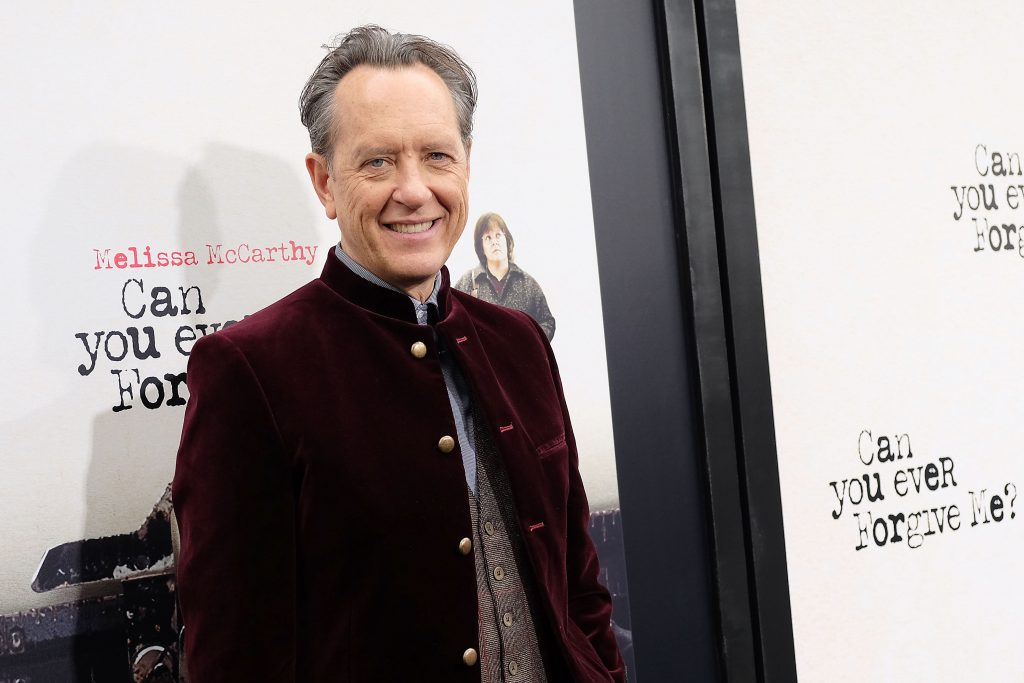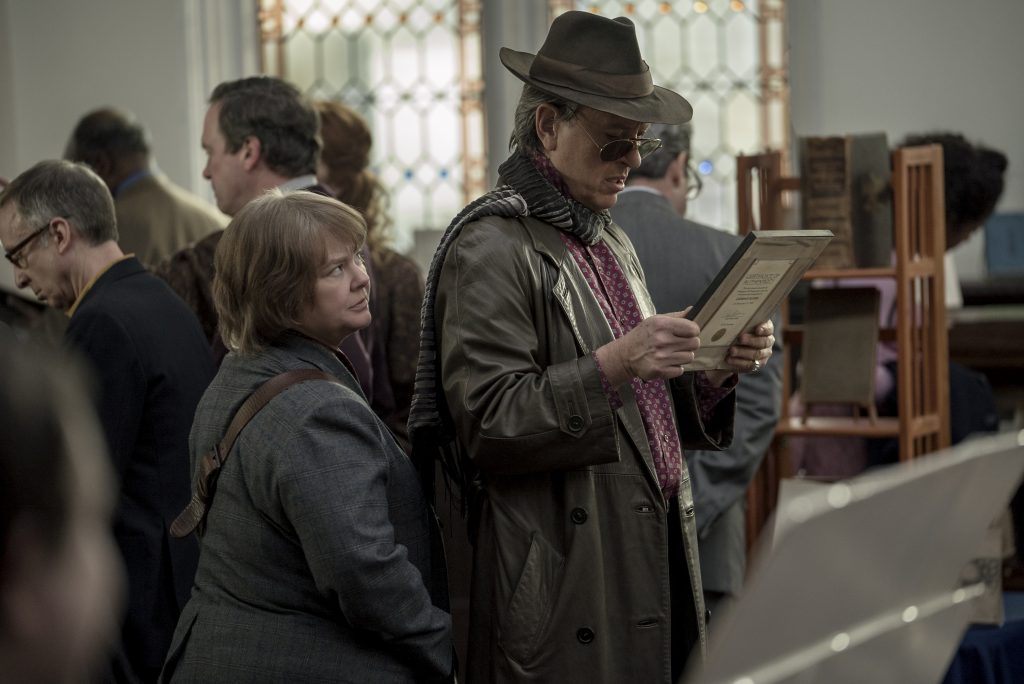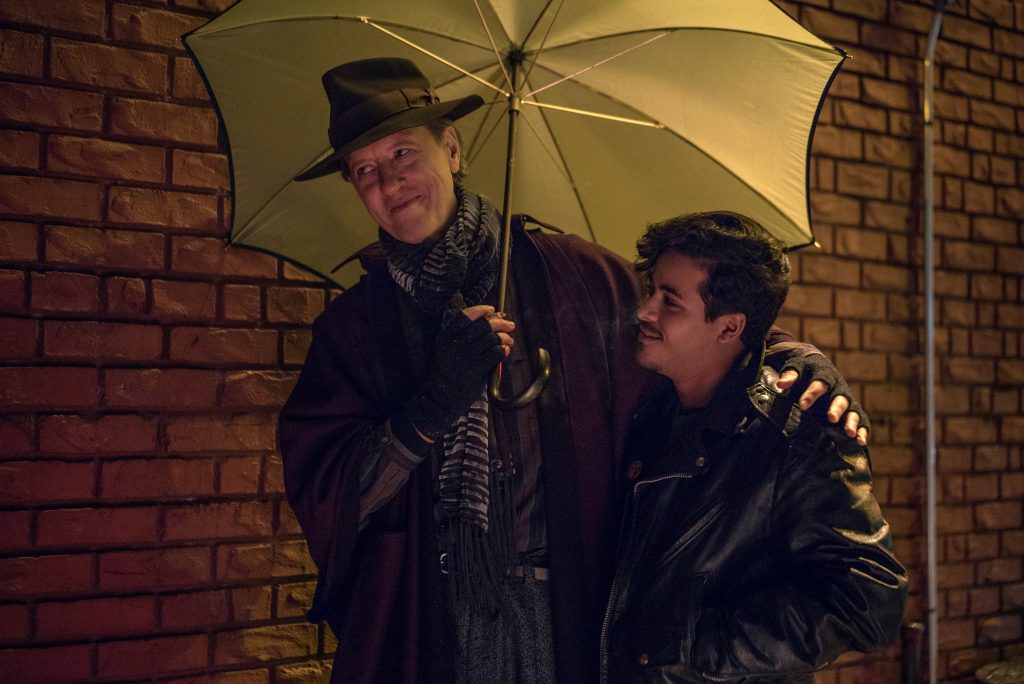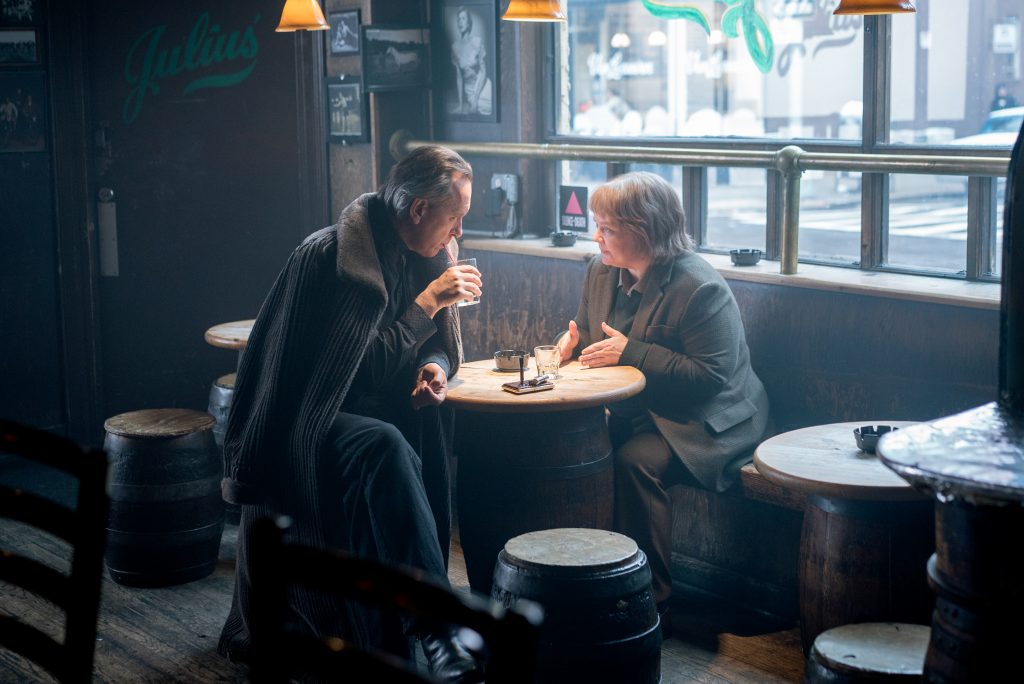October 19, 2018
by Carla Hay

Richard E. Grant has made a name for himself as a character actor in a wide variety of movies, such as the comedy “Withnail & I,” the period drama “The Age of Innocence” and the superhero flick “Logan.” He’s also had numerous roles in television, including playing the title character in “The Scarlet Pimpernel” and guest-starring on “Downton Abbey” and “Doctor Who.” And now he’s getting some of the best reviews of his career as flamboyant con man Jack Hock in the dramatic film “Can You Ever Forgive Me?,” which is inspired by the true story of author-turned-forger Lee Israel (played by Melissa McCarthy), who enlists Jack to help her in her forgery schemes. Grant has received a nomination for Best Actor at the 2018 IFP Gotham Awards for his role in the movie, which is also garnering critical raves and awards buzz for McCarthy.
Set in 1990s New York City, “Can You Ever Forgive Me?” tells the story of how a financially desperate Lee, who was once a successful biographer but whose latest books have been flops, turns to fabricating letters from famous dead authors and selling the forgeries to pay her bills. When some of her buyers start to get suspicious, she resorts to stealing real archived letters from research institutions, replacing the original letters with forgeries, and selling the stolen originals. “Can You Ever Forgive Me” is a crime drama, but it is also story is about how two opposites can attract—the prickly, introverted Lee and the charming, extroverted Jack—and form an unusual bond that is partially an alliance of convenience and partially an attempt to befriend each other out of loneliness. The real Lee Israel, who died in 2014 at the age of 75, forged hundreds of documents, and she and Hock were eventually caught and faced legal consequences. Hock was 47 when he died of complications from AIDS in 1994.
Israel wrote about her life of crime in the 2008 memoir “Can You Ever Forgive Me?” The movie was directed by Marielle Heller, with a screenplay by Nicole Holofcener and Jeff Whitty. The film’s cast also includes Dolly Wells as a bookstore owner who tries to befriend Lee; Jane Curtin as Lee’s increasingly exasperated agent; Anna Deavere Smith as Lee’s ex-lover whom Lee still tries to contact; and Ben Falcone (McCarthy’s real-life husband) and Stephen Spinella as literary collectors who make multiple purchases of Lee’s forgeries. Grant—who calls the film “a road movie in Manhattan that goes between bars and bookshops”—recently sat down with me and other journalists for a roundtable interview at the “Can You Ever Forgive Me?” press junket in New York City. Here is what he said.
What kind of insight did you bring to the Jack Hock character?
My immediate thought was, “What was the essence of what is happening in this story?” And I thought that [Lee Israel and Jack Hock] are like Jack Lemmon and Walter Matthau in ‘The Odd Couple,” and also like Dustin Hoffman and Jon Voight in “Midnight Cowboy.” You’ve got two people who are on the fringes of society that are lonely and they’re in New York and they’re struggling. Despite all the wealth that you see around you and millions of people, they’re lonely and they’re struggling. And I thought that was the basis of their platonic friendship was they’re trying to find a movie reference.
And then I thought, because I grew up in Africa, I always see people and try and understand characters as, “What kind of animal would they be?” Just to get a lead in. And I thought she is essentially a porcupine. She’s prickly and private, and you’re going to get hurt if you go in her. And I thought Jack was like a Labrador [retriever], in that he’ll just go up to anybody and lick them into submission, to try and get petted, to try and get a jump on somebody, or steal their food or whatever. But he won’t give up … They have this kind of odd, platonic love/hate relationship …
We were going to start [filming “Can You Ever Forgive Me?”] on a Monday, and I thought we were going to have a week of rehearsal. That didn’t happen … Melissa McCarthy was coming in to New York on Friday … I was very aware of her comedy movies, from very subtle to very broad, and I didn’t know at what level she was going to pitch Lee Israel. So mercifully, we met for a half a day on that Friday, talked through the script and all the scenes we had together. And from meeting Melissa, within five nanoseconds, I realized what kind of person she was. And I saw how she was pitching it, and that affected what I did.

“Can You Ever Forgive Me?” captures a bygone era of early 1990s New York City, before Times Square and other parts of Manhattan were cleaned up and made more tourist-friendly. Can you talk about that period of time?
The kinds of scams that you would see on 42nd Street … That doesn’t exist anymore, that kind of sleazefest that people operated in … I did a movie playing Sandra Bernhard’s husband called “Hudson Hawk” with Bruce Willis. And I went to meet with Sandra in the Meatpacking District in 1991, and on many street corners, there were emaciated men dying of AIDS, with placards saying, “I have no Medicare, my family has abandoned me, and I’m dying. Please help me.” It was so shocking, and I’ve never forgotten that …
In your research for this role, you couldn’t find any photos or video footage of Jack Hock. How did that lack of visual references affect how you portrayed him?
This was pre-social media. Now, we have people at Starbucks and they’re documenting it: “Look at me at Starbucks!” So, you’ve got a time, when all of his friends have died of AIDS, and a generation of men were being wiped out, and he was disowned by his family. So, if you’ve got people who’ve been disenfranchised to that degree, and then are dying of a plague, their photo records are minimal or don’t exist.
All I had to go on was that he had this shortened cigarette holder—because he was a chainsmoker, and he thought the [cigarette holder] would stop him from getting cancer—and that he had been in jail for two years for holding up a taxi driver at knifepoint because they disagreed about the fare. [And I knew] that he was tall, from Portland and blonde. That was a much of a description that Lee gave about him.
But she did say that he was really good at scamming, because if she reckoned that a letter that she’d done was worth 600 bucks, he’d come back with two grand. Even when he was trying to cheat off that two grand more money off her, he still was capable. He wasn’t good on the math, and he didn’t know who Fanny Brice was, which was bizarre to me, but he obviously had a way of charming people, and I thought that was a key to who he was.
He lived for the day, in the moment, and I think knowing that you have this time bomb of being HIV-positive probably added to that. “Tomorrow is literally another day; today might be my last.” I wish I could live my life like that but I’m too conservative, but it’s very endearing. I’ve known people like that all my life, and I’ve liked them and loved them, but I wouldn’t give them the keys to my apartment or my car or lend them money.

How would you define a true friend?
My dad, who died 37 years ago, said to me before he was dying, “If you have five friends in your life, consider yourself a rich man.” When it comes down to it, five is a lot: someone who you can call at 3 o’clock in the morning and who will hear you out. So how do you define a friend? Loyalty. Someone who is not married to you, who is not blood-related, someone who, despite what anyone else says, they know you, and you know them to the fullest extent.
Has playing Jack Hock made you appreciate your friends more?
Yes. I know Melissa [McCarthy] gains friends in every job that she does … But, in my experience [making a movie] is having really intense, emotional relationships for two or three or four or five months—and sustaining a friendship beyond that a testament of true friendship … I haven’t seen Melissa in a year, but our friendship is still intact, so it worked out.

Jack is very charismatic. How would you define charisma?
I have no idea. My answer is always the same. I don’t think it’s something you can teach. If you go into a roomful of people, and what this indefinable thing is that we call “talent” that makes you want to watch somebody more than the person right next to them who may be better-looking or better-dressed or have more money—that something that makes you want to watch them, I don’t know what that is. I think if we knew what it was, we could bottle and sell it and make a million bucks. I think it’s an energy inside someone that either demands attention or you’re just drawn to that person. Some people have it, and some people don’t.
You and Melissa McCarthy became very close while working on this movie. Can you share any stories of hanging out with her outside of work?
She was on the set in every scene, and I wasn’t. I’d just come on the days I wasn’t working. I had lunch with her every day. That is pretty unusual. That’s what we did.

Was it hard to have lunch with her in public since she’s so famous?
She had her Lee Israel wig on and a hat on, so we just walked down the street. And, you know, it’s New York City. We live in an age where the silhouette is this [he mimics someone staring into a smartphone], so actually looking up and having a conversation with somebody or recognizing somebody is far less [common]. We just walked around. [People recognizing us] didn’t happen.
“Can You Ever Forgive Me?” has a female-dominated crew: The director, co-screenwriter, two of the three producers, the film editor and art director are all women. How did having a female-led movie compare to other movies, whose crew leaders are typically men?
I’ll put it like this: It felt like the most de-testosterized, communal, nurturing collaborative environment. I think because it was such an intimate story and female-centric, whereas the movie that I just come off before that was called “Logan,” which had a crew of 300 men with arms thicker than my thighs. I’m not exactly chunky, but it was guns and jeeps and cars and cranes. I felt like a dandelion in the wind amongst this macho set, so the contrast was enormous. It was a different kind of movie. [“Logan”] had people with blades coming out of their hands, people being decapitated in all directions, and even the 12-year-old girl in this was karate killing people with batons, so there’s some contrast to the world of Lee Israel and Jack Hock.
